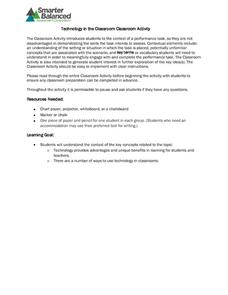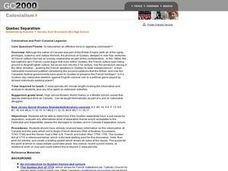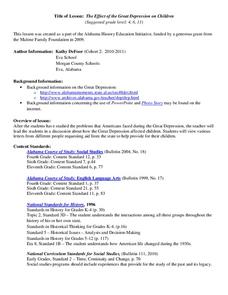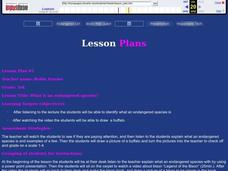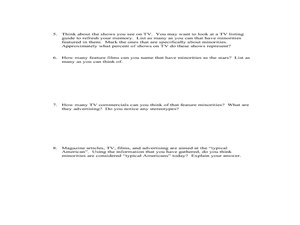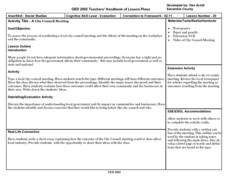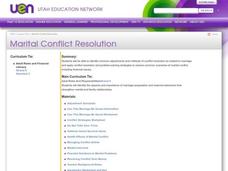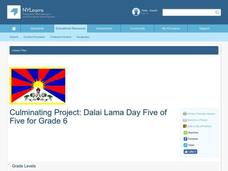Smarter Balanced
How the Brain Works
Cerebrum, cerebellum, brainstem, pituitary gland, and spinal cord. Prepare your class for a performance task assessment on the brain and how it works with a scripted plan that defines these terms and identifies the functions the...
US Institute of Peace
Identifying Conflict Styles
Are you a peace-keeper or a problem-solver? Explore conflict management styles through a lesson, fourth in a 15-part series, that combines individual assessment and collaborative work. Groups learn the basic tendencies of each style,...
Smarter Balanced
Technology in the Classroom
To prepare for a formative assessment on the benefits of technology in the classroom, groups generate a list of the types of technology that could be used in a classroom and then discuss how each of these items could be used. Group...
National Endowment for the Humanities
Martin Luther King, Jr. and Nonviolent Resistance
Was nonviolent resistance the best means of securing civil rights for black Americans in the 1960s? In this highly engaging and informative instructional activity, your young historians will closely analyze several key documents from the...
Smarter Balanced
Growth and Expansion of America
Despite the difficulty of travel, the US expanded significantly between the 1800s and the early 1900s. To prepare for a performance task assessment on the rapid expansion of the US in the 1800s, class members engage in a...
Louisiana Department of Education
Comprehensive Curriculum Social Studies (Grade 7)
US history from 1776 through 1877 is the focus of a comprehensive curriculum guide designed for seventh graders. Each of the seven units in the 102-page packet includes a list of guiding questions, grade-level expectations, links to...
Curated OER
Warm Up: When Modern Human Behavior Appeared in Early Hominids
Upper graders or entry college level learners use the provided article links to answer three questions regarding early modern human behavior. They compose short essay responses that accommodate each part of the overarching question,...
Curated OER
Culminating Writing Assessment: History
Students reflect on power, privilege, and standing in American society. In this writing skills lesson, students respond to the question, "If you are denied power, privilege, and equal standings with other Americans, how would you respond?"
Smarter Balanced
Exploring the World
To prepare for the Exploring the World Performance Task, class groups generate a list of places they would like to explore, examine images of seven natural wonders of the world, and consider why these sites are wondrous. A map and images...
Curated OER
Now That's Beautiful!
Your class experiences dozens of messages about beauty every day by reading magazines, watching movies, and listening to the radio. Have them analyze society's view of beauty in groups after discussing several resources, including...
Judicial Branch of California
Defining Civic Duty and Participation
A lesson, geared toward older elementary scholars, combines art with social studies to explain the purpose of civic duty and how to encourage others in the community to participate. Academics create advertising campaigns to promote civic...
Curated OER
Quebec Separatism
Students determine if the Quebec separatists have just cause for separation. They evaluate acceptable alternatives to separation. They assess damages to Quebec and Canada if separation occurs.
Curated OER
Teen America Travels New England
Students simulate the role of a travel agent to understand how to read and use road maps. They plan a bus trip through New England for a group of travelers that includes, bus travel, meals and attractions. They plan the distance that...
Curated OER
Bill of Rights
Students research, list, define and discuss all the aspects to the United States Bill of Rights. They assess their foundations by James Madison and Thomas Jefferson and reflect on all the conditions happening at the time period of...
Alabama Department of Archives and History
The Effect of the Great Depression on Children
How did the Great Depression affect children? Sometimes studying the Great Depression means only studying about how it affected adults, however, relating the experiences of children and peers their age to themselves may make the...
Curated OER
Where Were Your Ancestors in 1871?
Here is a nicely designed lesson on ancestry and family history. In it, learners read an article entitled, "Where Were Your Ancestors in 1871?" Then, they make up a series of questions to profile their family and their community 100...
Curated OER
What is an Endangered Species?
Here are two well-designed, and easy-to-follow lesson plans on endangered species for your third graders. The focus is on the bison; the history of the slaughter of the animals in the 1800's, and the story of how they were saved from...
Curated OER
Minorities in Mainstream American Society
So many people fought for Civil Rights in the United States. Read about the Civil Rights Act of 1964, and discuss what the act guarantees. Then pass out a slew of magazines and encourage them to observe how often minorities appear in...
Curated OER
A City Council Meeting
Here is an interesting plan for introducing your pupils to the workings of the local city council. The teacher must go videotape a city council meeting in it's entirety. Learners watch the tape, and discuss what they observed from the...
Curated OER
Marital Conflict Resolution
While not everybody will end up married, everybody does need to know how to resolve conflict. Learners examine several real-life scenarios involving a married couple. They use problem-solving strategies to help the couple come to an...
Curated OER
The Pumpkin Patch - A Venture in Agritourism
After reading an article about how agritourism is helping boost the financial stability of local farms, middle schoolers answer comprehension questions. This is a case-study of Canadian pumpkin producers. It could be useful as a...
Curated OER
Dalai Lama
Sixth graders use skills and knowledge that they gained from their Tibet unit to formulate a final product of their Tibet journey. This study covers topics such as Tibet's geographical location, religious beliefs, customs, dress, and way...
Curated OER
The 50 States
Fifth graders use a database to gather information on the United States. Using this information, they try to describe the settlement patterns in the various states. They enter additional information into the database and use queries to...


